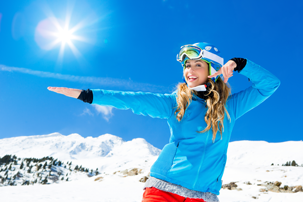
Take care of your eyes - check how to protect them during a winter |
| 03.12.2017 |

Frigid, dry air, intense sunlight, central heating, and long evenings in artificially lit surroundings – the winter is rather brutal to our eyes. During the cold season our eyes are particularly subject to adverse conditions. It is important to keep that in mind and to pay special attention to protecting them.
Intense sunlight is not the only type of radiation that reaches us during the winter. It is the time of extensive outside activities such as skiing, snowboarding or long walks. The snow, despite being the source of so much fun, acts like a mirror and reflects up to 85% of harmful solar radiation. This may, after only 2 hours spent outside, to acute conjunctivitis and corneal injury. To protect your eyes during the winter remember to wear sunglasses during outside activities. Be sure to choose a model which has both UV filter and additional filters (e.g. polarisation filter). A pair of good sunglasses will not only protect you from harmful radiation but also will prove useful in limiting exposure to frigid and dry wind.
Remember to keep your eyes moisturised, especially during the winter. Freezing weather causes excessive lacrimation and redness of the eyes, sometimes to a degree leading to photophobia. Inside the conditions are bad too – air conditioning and heating dries the atmosphere in which you spend to most of your day. Lacrimal film evaporates quickly – this leads to feeling of sand under the eyelids. You can say that the eyes experience a real shock due to these sudden changes of climate. It is of particular disturbance to people suffering from the dry eye syndrome. It is advisable to take eye drops (artificial tears) wherever you go. Just apply one or two drops into the conjunctival sac and you will feel instant relief.
Extensive work in front of the computer and long wintery evenings in artificially lit surroundings may alleviate the above mentioned symptoms. Be sure to take a break and give your eyes some rest.
In the summer, when the temperatures are high, we tend to drink more – our organisms signal the need for hydration via the feeling of thirst. During the winter this mechanism works less efficiently and we tend to forget to replenish our internal water reserves. This, combined with dry air, may have negative consequences for our eyes.
Don’t be fooled by the fact that it is cold outside. Frigid and sunny days are perfect conditions for fresh air activities and protecting our eyes while being outside is crucial to maintaining their healthy state for the years to come.